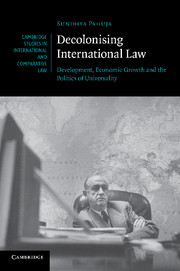Book contents
- Frontmatter
- Contents
- Acknowledgements
- 1 Introduction
- 2 Inaugurating a new rationality
- 3 From decolonisation to developmental nation state
- 4 From permanent sovereignty to investor protection
- 5 Development and the rule of (international) law
- 6 Conclusion
- Appendix One A note on the use of ‘Third World’
- Appendix Two Harry Truman – Inaugural Address
- Bibliography
- Index
- cambridge studies in international and comparative law
- References
5 - Development and the rule of (international) law
Published online by Cambridge University Press: 07 October 2011
- Frontmatter
- Contents
- Acknowledgements
- 1 Introduction
- 2 Inaugurating a new rationality
- 3 From decolonisation to developmental nation state
- 4 From permanent sovereignty to investor protection
- 5 Development and the rule of (international) law
- 6 Conclusion
- Appendix One A note on the use of ‘Third World’
- Appendix Two Harry Truman – Inaugural Address
- Bibliography
- Index
- cambridge studies in international and comparative law
- References
Summary
Introduction
Over the last ten or so years, the rule of law has experienced a marked rise in popularity. As many have observed, after the end of the Cold War and by the middle of the 1990s the rule of law was being advanced by all kinds of strange bedfellows as a panacea for the world’s ills – from Russia to China, from Rwanda to Bosnia, its implementation was seen as a ‘rising imperative of the era of globalisation’. And although widespread faith in its international dimension seems to have diminished somewhat since the inauguration of the ‘war on terror’, the embrace of the rule of law by the development institutions and associated aid machinery has, if anything, tightened rather than slackened. Around the end of the 1980s the World Bank in particular, as well as the International Monetary Fund (IMF), began to take an interest in ‘governance’ and institutions – including law generally – and their role in the promotion of development. Not long after this already significant shift, the rule of law was directly invoked for the first time as both cause and result of development in the 1997 issue of the World Development Report, the Bank’s flagship publication.
Many causes have been given for the rising surge of interest in the relationship between law and development within the aid and development community. These include ‘the post-Glasnost developments in Central and Eastern Europe, … the post Brady Plan revitalization of Latin American economies’, as well as the near collapse of many sub-Saharan African states. However, although these factors are relevant, they are symptomatic rather than causative of the re-emergence of ‘rule of law’ talk, and the belief in (yet) another ‘new world order’ in the aftermath of the Cold War. That governance and the ‘rule of law’ were offered as solutions to the developmental and economic ‘crises’ of the 1990s was neither axiomatic nor inevitable, but depended first upon a more complex and pluralistic re-emergence of the importance of law in the aftermath of the Cold War. The story of that re-emergence and its ongoing consequences is the third and final telling instance of the dual quality of international law being explored in this book.
- Type
- Chapter
- Information
- Decolonising International LawDevelopment, Economic Growth and the Politics of Universality, pp. 172 - 253Publisher: Cambridge University PressPrint publication year: 2011

